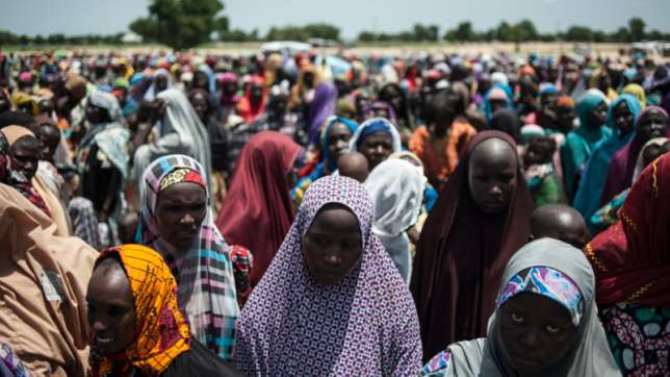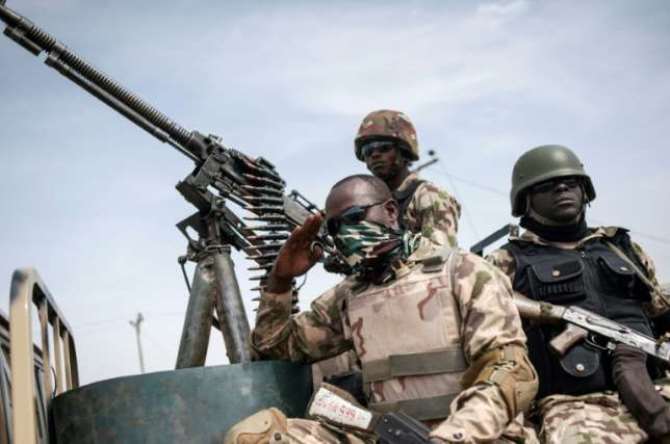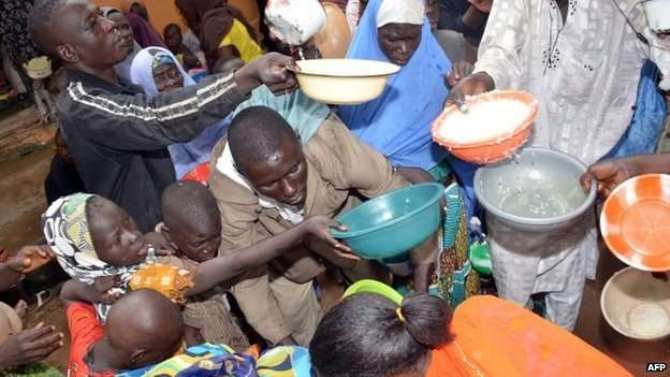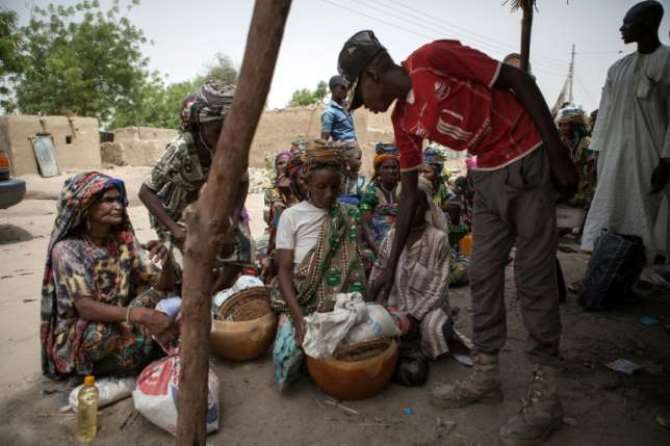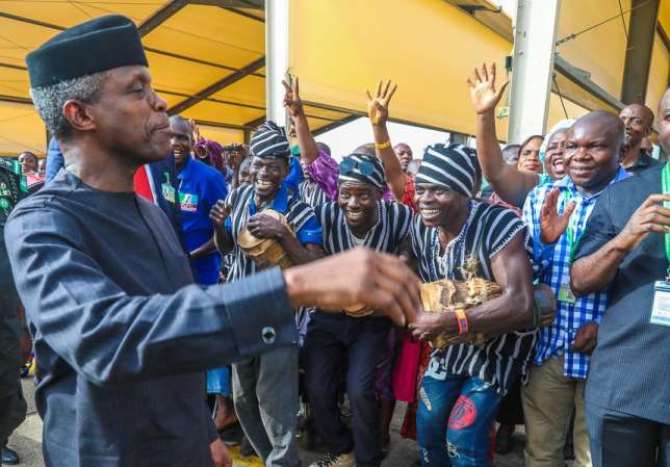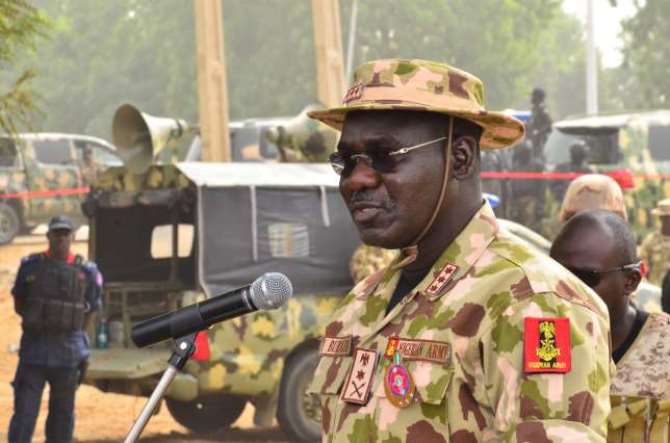Amnesty International ‘Nigerian soldiers rape girls in IDP camps in exchange for food’
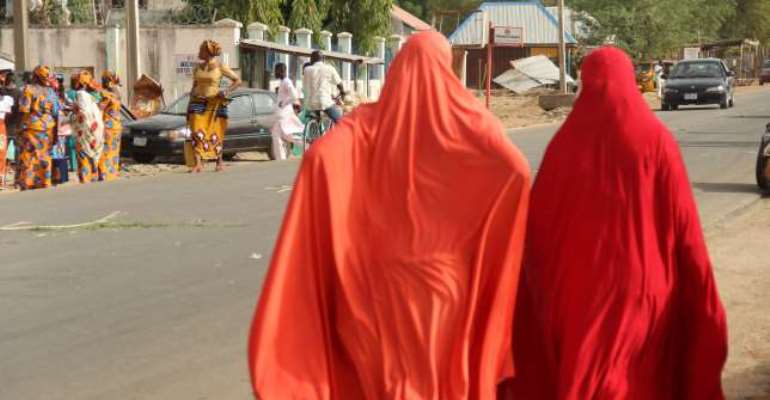
According to Amnesty International, Nigerian soldiers and civilian JTF members often rape women in IDP camps in exchange for food.
Millions of Nigerians in war ravaged north east States of Borno, Adamawa and Yobe have been fleeing the Boko Haram insurgency which began in 2009.
The refugees often end up in camps for displaced persons where food is oftentimes a luxury.
AI says the displaced who often have little food to eat, have been turned to sex slaves by persons who are supposed to protect them from terrorists.
Girls and women in the northeast are at the mercy of Boko Haram fighters (Today)
According to the AI report, displaced women confined to remote camps have been forced to become “girlfriends” of military in exchange for humanitarian assistance.
The organisation adds that thousands have died of starvation due to lack of food in the camps.
Separating women from husbands
AI writes that the Nigerian military and Civilian Joint Task Force (JTF) have separated women from their husbands and confined them in remote “satellite camps” where they have been raped, sometimes in exchange for food.
The group says it has collected evidence that thousands of people have been starved to death in the camps in Borno since 2015.
Borno has worryingly remained the epicenter of the Boko Haram insurgency with the terrorist sect believed to be hiding in the hills bordering a vast Sambisa forest.
“It is absolutely shocking that people who had already suffered so much under Boko Haram have been condemned to further horrendous abuse by the Nigerian military,” Amnesty International Nigeria Director, Osai Ojigho said.
Soldiers on duty in a war ravaged northeast region (AFP/File)
“Instead of receiving protection from the authorities, women and girls have been forced to succumb to rape in order to avoid starvation or hunger,” Ojigho added.
The report noted that in some cases, the abuse appears to be part of a pattern of persecution of anyone perceived to have a connection to Boko Haram.
According to the report, women have shared tales of being beaten and called “Boko Haram wives” by security officials when they complained about how badly they are treated.
The Boko Haram insurgency has led to a humanitarian crisis in the northeast (The Sheet)
“As Nigeria’s military recovered territory from the armed group in 2015, it ordered people living in rural villages to the satellite camps, in some cases indiscriminately killing those who remained in their homes. Hundreds of thousands of people have fled or were forced from these areas.
“The military screened everyone arriving to the satellite camps, and in some locations detained most men and boys aged between 14 and 40 as well as women who travelled unaccompanied by their husbands. The detention of so many men has left women to care for their families alone,” the report read.
Available for sex on an ongoing basis
Amnesty International says scores of women have described how soldiers and Civilian JTF members have used force and threats to rape women in satellite camps, taking advantage of hunger to coerce women to become their “girlfriends”.
The women are then forced to be available for sex on an ongoing basis, AI says.
Five women told Amnesty International that they were raped in late 2015 and early 2016 in Bama Hospital camp as famine-like conditions prevailed.
Ama (not her real name), 20, said: “They will give you food but in the night they will come back around 5pm or 6pm and they will tell you to come with them… One (Civilian JTF) man came and brought food to me. The next day he said I should take water from his place (and I went).
“He then closed the tent door behind me and raped me. He said I gave you these things, if you want them we have to be husband and wife".
Displaced persons in a camp (AFP)
Ten others in the same camp said that they were also coerced into becoming “girlfriends” of security officials to save themselves from starvation, according to the report.
Most of these women had already lost children or other relatives due to lack of food, water and healthcare in the camps.
“The sexual exploitation continues at an alarming level as women remain desperate to access sufficient food and livelihood opportunities,” Amnesty International explained in its report.
“Sex in these highly coercive circumstances is always rape, even when physical force is not used, and Nigerian soldiers and Civilian JTF members have been getting away with it. They act like they don’t risk sanction, but the perpetrators and their superiors who have allowed this to go unchallenged have committed crimes under international law and must be held to account,” said Ojigho.
Military, federal government reacts
In a swift reaction, the Nigerian government and the military have called Amnesty International’s latest report a tissue of lies and a regurgitation of its previous 'false' reports.
Senior Special Assistant to the President on Media and Publicity, Malam Garba Shehu, said the latest report from AI lacked credibility.
Shehu added that the report fell short of factual claims that could have provided the lead for investigation.
According to Shehu; “Engagement was claimed to have been made with Nigerian authorities but which authority is it, is not provided with clarity.
President Buhari's spokesperson Garba Shehu (Punch)
“This then is just a wild goose chase report, in essence.
“In some breath, the report seemed like the one in 2015, and the one in 2016, and the one after that year, the same things being recycled again and again.
“It ignores the fact of the existing mechanisms put in place by the military, as a self-correcting step and the high-level committee constituted by the Presidency to examine any such claims".
Shehu observed that over a period of time, the Nigerian military had established cases of abuse and punishments meted out from Orderly Room trials and Court Martials that resulted in losses of rank, dismissals, trials and convictions by civil courts.
Vice President Yemi Osinbajo visits Benue following gunmen attack in the north central State (Presidency)
The presidency spokesperson quoted President Buhari who said during his recent joint press conference with President Trump at the White House that “the government of Nigeria remains deeply committed to the principles of human rights, as well as promotion and protection of people's freedom, even in the process of fighting terror.
“We commit to ensure that all documented cases of human rights abuses are investigated, and those responsible for violation held responsible.”
The Defence Headquarters in a statement by the Director of Defence Information (DDI), Brig-Gen. John Agim, described Amnesty International’s report as the continuation of the organisation's malicious trend.
Tukur Buratai is Nigeria's Chief of Army (Nigerian times)
Agim described AI’s report as unfortunate.
Agim said in times like this, Al is expected to apply the natural law of liaison by working with security agencies as partners.
According to him, this would have been the best way to ensure that insurgency and crisis are completely wiped off rather than engaging in "falsehood, maligning the military and painting her in bad light at any slight opportunity".
Agim said: “The Nigerian military wishes to use this medium to reiterate her commitment to the citizens of our dear nation, that it will abide by all human rights regulations as entered into by Nigeria and also go the extra mile in ensuring that the territorial integrity of our nation is well protected.”
Amnesty International has slated Nigeria’s human rights records and rules of engagements in past reports.
The United States refused to sell weapons to Nigeria during the Barack Obama era because of an Amnesty International report which indicted soldiers fighting Boko Haram in the north east.
Source: Pulse Nigeria

